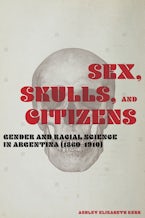


The writers studied here (an eclectic group of scientists, anthropologists, and novelists, including Estanislao Zeballos, Lucio and Eduarda Mansilla, Ramón Lista, and Florence Dixie) reflect on Indigenous sexual practices, analyze the advisability and effects of interracial sex, and use the language of desire to narrate encounters with Indigenous peoples as they try to scientifically pinpoint Argentina's racial identity and future potential.
Kerr's reach extends into history of science, literary studies, and history of anthropology, illuminating a scholarly time and place in which the lines betwixt were much blurrier, if they existed at all.
Ashley Elizabeth Kerr is an assistant professor of Spanish at the University of Idaho.
“The protagonists here are not the well-known men that dominated the politics and science of the time, but women who were also participating in the transformation of Argentina. Even those women who were more oppressed are analyzed as active contributors ‘to the development of Argentine racial science.’ This is a solid and needed contribution to the field.”~Adriana Novoa
—Adriana Novoa, coauthor of From Man to Ape: Darwinism in Argentina, 1870–1920
“The presence of Indigenous women in Argentine national and scientific discourses as agents of such discourses and debates is one of the book’s strongest points. The twofold goal of introducing gender and sex to the study of scientific discourses and, at the same time, explaining the scientific roots of many social debates and literary works on race, gender, and civilization is consistent throughout.”~Vanesa Miseres
—Vanesa Miseres, author of Mujeres en tránsito: Viaje, identidad y escritura en Sudamérica (1830–1910)
Receive special announcements and offers in areas of your choice!
This website uses cookies so that we can provide you with the best user experience possible. Cookie information is stored in your browser and performs functions such as recognising you when you return to our website and helping our team to understand which sections of the website you find most interesting and useful.
Strictly Necessary Cookie should be enabled at all times so that we can save your preferences for cookie settings.
If you disable this cookie, we will not be able to save your preferences. This means that every time you visit this website you will need to enable or disable cookies again.
